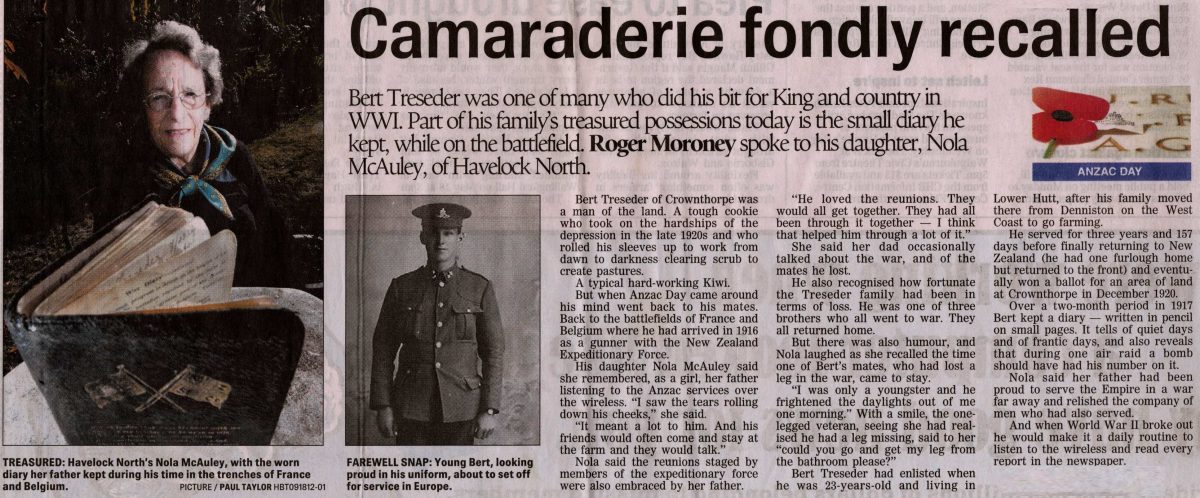Camaraderie fondly recalled
Bert Treseder was one of many who did his bit for King and country in WWI. Part of his family’s treasured possessions today is the small diary he kept, while on the battlefield. Roger Moroney spoke to his daughter, Nola McAuley [McAulay], of Havelock North.
ANZAC DAY
Bert Treseder of Crownthorpe was a man of the land. A tough cookie who took on the hardships of the depression in the late 1920s and who rolled his sleeves up to work from dawn to darkness clearing scrub to create pastures.
A typical hard-working Kiwi.
But when Anzac Day came around his mind went back to his mates. Back to the battlefields of France and Belgium where he had arrived in 1916 as a gunner with the New Zealand Expeditionary Force.
His daughter Nola McAuley said she remembered, as a girl, her father listening to the Anzac services over the wireless. “I saw the tears rolling down his cheeks,” she said.
“It meant a lot to him. And his friends would often come and stay at the farm and they would talk.”
Nola said the reunions staged by members of the expeditionary force were also embraced by her father.
“He loved the reunions. They would all get together. They had all been through it together – I think that helped him through a lot of it.”
She said her dad occasionally talked about the war, and of the mates he lost.
He also recognised how fortunate the Treseder family had been in terms of loss. He was one of three brothers who all went to war. They all returned home.
But there was also humour, and Nola laughed as she recalled the time one of Bert’s mates, who had lost a leg in the war, came to stay.
“I was only a youngster and he frightened the daylights out of me one morning.” With a smile, the one-legged veteran, seeing she had realised he had a leg missing, said to her “could you go and get my leg from the bathroom please?”
Bert Treseder had enlisted when he was 23-years-old and living in Lower Hutt, after his family moved there from Denniston on the West Coast to go farming.
He served for three years and 157 days before finally returning to New Zealand (he had one furlough home but returned to the front) and eventually won a ballot for an area of land at Crownthorpe in December 1920.
Over a two-month period in 1917 Bert kept a diary – written in pencil on small pages. It tells of quiet days and of frantic days, and also reveals that during one air raid a bomb should have had his number on it.
Nola said her father had been proud to serve the Empire in a war far away and relished the company of men who had also served.
And when World War Il broke out he would make it a daily routine to listen to the wireless and read every report in the newspaper.
Photo captions –
TREASURED: Havelock North’s Nola McAuley, with the worn diary her father kept during his time in the trenches of France and Belgium.
PICTURE / PAUL TAYLOR
FAREWELL SNAP: Young Bert, looking proud in his uniform, about to set off for service in Europe.












Do you know something about this record?
Please note we cannot verify the accuracy of any information posted by the community.